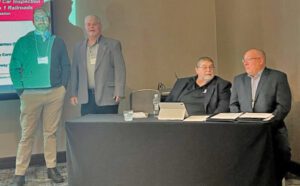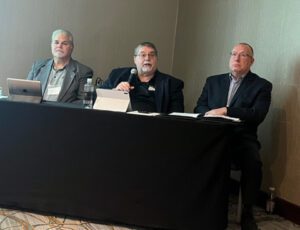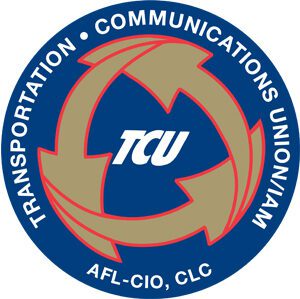
TCU Legislative Director David Arouca, Brotherhood Railway Carmen General President Don Grisson, Carmen Assistant General President Carl Lakin and Carmen Vice-President Darrin Treiber
Last week, TCU and Carmen Division leaders attended the Federal Railroad Administration’s 2nd annual Rail Share Conference in Kansas City to engage directly with industry and government leaders on rail safety issues.
Speaking to a packed audience of FRA officials and Class 1 railroad managers and executives, TCU National Legislative Director Dave Arouca led a presentation and panel discussion with BRC General President Don Grissom, Asst. General President Carl Lakin, and Gen. Vice President Darren Treiber. The presentation focused on the ongoing safety issues facing the Carmen craft, including:
- The dwindling time Carmen have to complete railcar inspections (i.e. ~1-min per car);
- The abuse of regulatory loopholes to allow unqualified personnel to perform safety inspections (see below);
- Increased and unfair disciplinary efforts Carmen face reporting defects/bad orders;
- The safety argument for having Qualified Mechanical Inspectors (QMIs) handling new camera-based inspection technologies;
- And, the ongoing concern that profits are being prioritized over safety in the precision scheduled railroading (PSR) era.
 Specifically, BRC leadership voiced their concerns with the Part 215.13, Appendix D regulatory loophole that many Class I railroads have used to cut down on inspections and eliminate carmen positions across the country. The Part 215.13 and Appendix D was drafted to allow train crew such as conductors to perform necessary inspections when a qualified mechanical inspector (QMI) isn’t traditionally present (i.e. out on the network picking up freight).
Specifically, BRC leadership voiced their concerns with the Part 215.13, Appendix D regulatory loophole that many Class I railroads have used to cut down on inspections and eliminate carmen positions across the country. The Part 215.13 and Appendix D was drafted to allow train crew such as conductors to perform necessary inspections when a qualified mechanical inspector (QMI) isn’t traditionally present (i.e. out on the network picking up freight).
While the Appendix D exception is necessary, as QMI’s aren’t expected to travel with the train to every juncture, Class 1 railroads have purposefully abused the regulation by eliminating Carmen altogether at various yards, by placing Carmen at satellite yards, or holding trains just outside of yards in order to bypass inspections. These practices may serve to lower dwell times, but none are safe practices for the railroads or the general public.
The BRC asked industry leaders and FRA officials for their help in improving rail safety across the country, and expressed their desire and willingness to do whatever is needed to improve safety practices in the industry.

